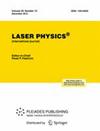通过非赫米提操作提高同时具有自发发射和相消的量子密集编码的容量
IF 1.1
4区 物理与天体物理
Q4 OPTICS
引用次数: 0
摘要
我们利用非赫米态运算方法,提出了一种改进量子密集编码的方案,该方案针对的是与零温储层相互作用的量子比特-量子比特系统,同时具有自发发射和去相干特性。通过求解双量子比特系统的主方程,我们从数值上得到了量子密集编码的最终容量。数值结果明确显示,非赫米提操作确实有助于改善振幅-相位退相干的非赫米提操作。特别是,在强衰变率情况下,非ermitian 运算比衰变率小的非ermitian 运算能更有效地保护量子密集编码。本文章由计算机程序翻译,如有差异,请以英文原文为准。
Improving the capacity of quantum dense coding with both spontaneous emission and dephasing by non-Hermitian operation
Using a non-Hermitian operation approach, we propose a scheme to improve quantum dense coding of a qubit-qubit system interacting with a zero-temperature reservoir with both spontaneous emission and dephasing. By solving the master equation of the two-qubit system, we numerically obtain the final capacity of quantum dense coding. The numerical results show explicitly that the non-Hermitian operation indeed helps to improve the non-Hermitian operation from amplitude-phase decoherence. In particular, non-Hermitian operations can protect quantum dense coding more efficiently in the case of strong decay rates than those with small decay rates.
求助全文
通过发布文献求助,成功后即可免费获取论文全文。
去求助
来源期刊

Laser Physics
物理-光学
CiteScore
2.60
自引率
8.30%
发文量
127
审稿时长
2.2 months
期刊介绍:
Laser Physics offers a comprehensive view of theoretical and experimental laser research and applications. Articles cover every aspect of modern laser physics and quantum electronics, emphasizing physical effects in various media (solid, gaseous, liquid) leading to the generation of laser radiation; peculiarities of propagation of laser radiation; problems involving impact of laser radiation on various substances and the emerging physical effects, including coherent ones; the applied use of lasers and laser spectroscopy; the processing and storage of information; and more.
The full list of subject areas covered is as follows:
-physics of lasers-
fibre optics and fibre lasers-
quantum optics and quantum information science-
ultrafast optics and strong-field physics-
nonlinear optics-
physics of cold trapped atoms-
laser methods in chemistry, biology, medicine and ecology-
laser spectroscopy-
novel laser materials and lasers-
optics of nanomaterials-
interaction of laser radiation with matter-
laser interaction with solids-
photonics
 求助内容:
求助内容: 应助结果提醒方式:
应助结果提醒方式:


